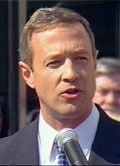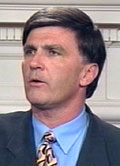 |
 |
| Gubernatorial
candidates Martin O'Malley, the Democratic mayor of Baltimore, and Republican Gov. Robert Ehrlich.
(CNS-TV file photos) |
Governor's Race: Ehrlich
vs. O'Malley on the
Issues
By Damon Curry
Maryland Newsline
Monday, Oct. 30, 2006
Republican Gov. Robert L. Ehrlich Jr. faces
Baltimore Mayor Martin
O'Malley, a Democrat, in the Nov. 7 gubernatorial election. Education and crime
have figured prominently in their campaigns. Find out where the candidates stand
on these issues and more -- and who you are most similar to. Mark the responses
below that
best match yours. At the end, click on the “get score” button to see what percentage of your
responses align with each candidate’s. Then click "party
lines" to see at a glance who gave each response. (Ehrlich's will outline in a
red border, O'Malley's in a blue.)
Based on e-mail correspondences with the campaigns of Robert Ehrlich and Martin O'Malley.
Read an elaboration of their responses.
Top
of Page | Home Page
Banner graphic by
Maryland Newsline's April Chan, incorporating original photos and images
provided by Annapolis.gov and Ace-Clipart.com.
Copyright © 2006 University of Maryland Philip Merrill
College of Journalism. All rights reserved. Reproduction in
whole or in part without permission is
prohibited. |
